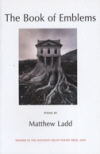The Book of Emblems
Matthew Ladd’s poetry collection, The Book of Emblems, reminded me of a modern take on Larkin’s Whitsun Weddings. Larkin, perhaps an influence on Ladd’s work, is referred to in his poem “Imitation,” which begins “When I read Philip Larkin / and picture him mugging to Kingsley about WATCHING SCHOOL-GIRLS” and goes on to say, admiringly, “Larkin is such an unrepentant asshole / and for all that, still beautiful, // like an aging circus performer.” The author admires and identifies with Larkin in the difficulty of writing poetry, concluding “how impossible the accurate naming of things: / cathedrals, children, the blank self-regard of the bachelor.”
Matthew Ladd’s poetry collection, The Book of Emblems, reminded me of a modern take on Larkin’s Whitsun Weddings. Larkin, perhaps an influence on Ladd’s work, is referred to in his poem “Imitation,” which begins “When I read Philip Larkin / and picture him mugging to Kingsley about WATCHING SCHOOL-GIRLS” and goes on to say, admiringly, “Larkin is such an unrepentant asshole / and for all that, still beautiful, // like an aging circus performer.” The author admires and identifies with Larkin in the difficulty of writing poetry, concluding “how impossible the accurate naming of things: / cathedrals, children, the blank self-regard of the bachelor.”
The “blank self-regard of the bachelor” encapsulates the tone of this collection. The poems offer an intelligent and detached perspective on life. In “And the Merciful Harrow Grew Dull,” the speaker begins to allow the reader into his inner thoughts, delving into his memories of his deceased mother. The poem pulls back, however, in the concluding lines, focusing instead on the ending of The Trial, then on speaker’s changed perspective of the world as “apologetic” rather than cruel. Though the poems are largely about the author, they keep a certain distance, focusing more on the author’s knowledge rather than the author’s inward life. In “Fountain of the Planet of the Apes,” this theme is summed up in the lines “She said, ‘Our knowledge removes us from our past,’ / and I didn’t say, ‘It also removes us from each other.’”
In keeping with the attention to self, Ladd concludes the collection with a poem obsessing about his work, “Coelacanth.” Resisting writing, he states:
Is it such a crime to stop writing?
We all could burn our manuscripts
and not once dwell on their absence.
Then I would be at liberty
to sit all day at the kitchen table
carving toys for my children
The second stanza of the short poem goes on to conclude with a news report of fisherman catching a coelacanth, a metaphor such as the ones he is trying to “burn,” representing the elusive and rare action of writing a truly great poem.
The Book of Emblems, though aloof, is a collection with substance, one that is well-worth the read.





